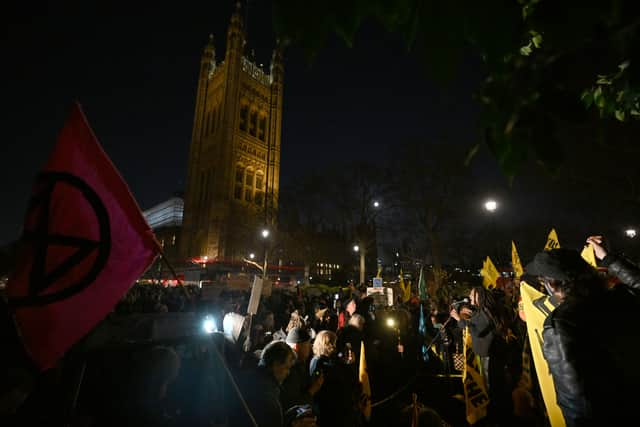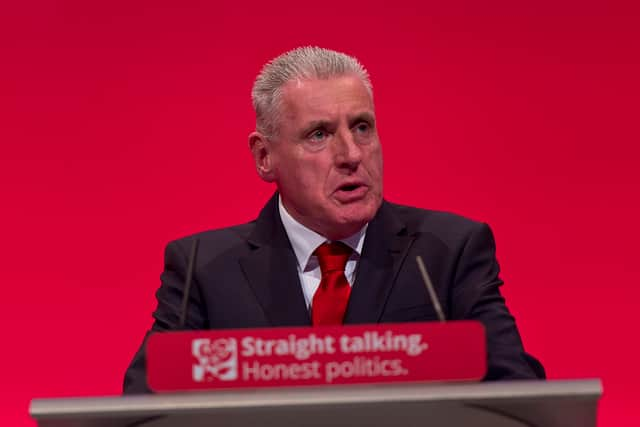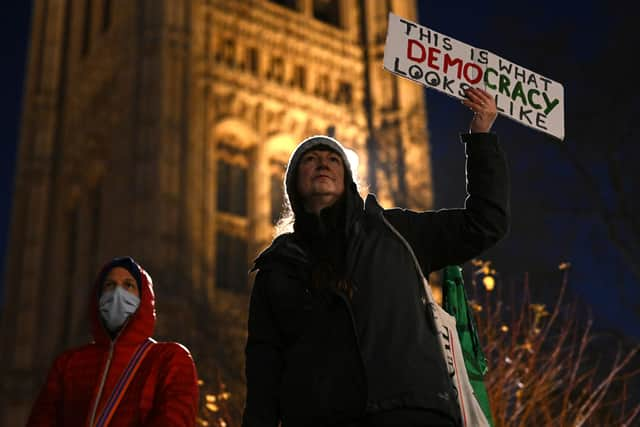Kill the Bill protest: what is the Police, Crime, Sentencing and Courts Bill - and why is it controversial?
This article contains affiliate links. We may earn a small commission on items purchased through this article, but that does not affect our editorial judgement.
and live on Freeview channel 276
The government has been defeated in the House of Lords over a crackdown on noisy protests - among other measures.
The amendment to protests was included in the controversial Police, Crime, Sentencing and Courts Bill - which has sparked ‘Kill The Bill’ protests up and down the country.
Advertisement
Hide AdAdvertisement
Hide AdThe Bill is a huge piece of legislation which includes major government proposals on crime and justice in England and Wales.
So, what is the Bill and why has it been so controversial in the past? Here’s what you need to know.


What is the Police, Crime, Sentencing and Courts Bill?
The Police, Crime, Sentencing and Courts Bill has proved extremely controversial over the past year.
But more recently, demonstrations took place in cities including London, Bristol, Coventry, Newcastle, Liverpool, Manchester, Sheffield and Plymouth on 15 January - ahead of a crucial vote on the Bill by peers inside the House of Lords two days later.
Advertisement
Hide AdAdvertisement
Hide AdProtesters describe the Bill as a draconian and anti-democratic crackdown on the right to assembly, freedom of expression and other civil liberties.
Before being debated by the House of Lords, the Bill proposed putting protesters at risk of lengthy prison sentences and hefty fines for actions that cause “serious annoyance”, which could be done just by making noise, and for anyone found guilty of damaging a statue or memorial.
It would expand police stop-and-search powers, and new laws against residing on land without authorisation with a vehicle would effectively criminalise the way of life of gypsy, Roma and traveller communities.
Amendments added to the Bill by the government in the House of Lords in November make it a criminal offence to obstruct major transport works or attach oneself to objects or people, and would equip police with the power to ban named individuals from demonstrating or even using the internet to encourage others to do so.
Advertisement
Hide AdAdvertisement
Hide AdHome Secretary Priti Patel has argued that the laws are to rein in disruptive protest actions by groups such as Insulate Britain, who have glued themselves to motorways, but critics say its impact would be much further reaching.
What was said in the House of Lords about the right to protest?
Amendments to the Bill included curbing noisy protests which were voted against in the House of Lords on 17 January.
The Bill said that a protest should be prohibited if it causes “serious unease, alarm or distress” - with one Lord calling the proposals “repressive”.
Lord Vernon Coaker, a Labour frontbencher, said no government has ever sought to ban protests before.
Advertisement
Hide AdAdvertisement
Hide Ad“Has democracy collapsed in the face of noisy protests over the last couple of centuries? It has not,” he said.
“At some of the protests that I have been on—and, I am sure, at those that many noble Lords have been on—the noise has been phenomenal. It has been part of the object of them. Never have any government of any colour sought to ban protests on the basis of noise or to put conditions on the basis of noise.”


The defeats came as the drumming outside Parliament of protesters opposed to the Bill could be heard inside the chamber.
The clause was numbered 57 and was removed from the Bill by a majority of 67 people, with 238 peers backing the Lib Dem-led amendment and 171 Lords voting against it.
Advertisement
Hide AdAdvertisement
Hide AdGreen Party peer Baroness Jones of Moulsecoomb branded the government move to impose noise conditions as “repressive”.
She said: “They are plain nasty and they really have to go.”
Labour former cabinet minister Lord Hain, who was a leading anti-apartheid campaigner, said: “This Bill, in my view, represents the biggest threat to the right to dissent and non-violent protest in my lifetime. It’s deeply reactionary. It’s an authoritarian attack on the fundamental liberties of our citizens.”
The Bishop of Leeds, the Rt Rev Nick Baines, argued the statues of Mahatma Gandhi and Nelson Mandela would have to be removed from outside Parliament were the Government provisions to be approved.


Has a government spokesperson spoken out after the defeat?
Advertisement
Hide AdAdvertisement
Hide AdDeputy Prime Minister Dominic Raab suggested the government would bring back controversial measures against noisy protest after a series of defeats in the Lords.
Asked if they would be reintroduced, the Justice Secretary told BBC Radio 4’s Today programme: “We’ll look very carefully at all of that, but, yes, absolutely.
“In relation to noise, of course we support the right to peaceful and rambunctious protest, but it cannot be allowed to interfere with the lives of the law-abiding majority.”
What other defeats did the government suffer?
Peers also defeated the government in backing an amendment that would make misogyny a hate crime.
Advertisement
Hide AdAdvertisement
Hide AdThe amendment to the Police, Crime, Sentencing and Courts Bill, put forward by Conservative peer and former victims’ commissioner Baroness Newlove, was backed by 242 votes to 185, majority 57, in the House of Lords.
The change to the Bill would give the courts the power to treat misogyny as an aggravating factor in any crime and increase sentences accordingly.
A message from the editor:
Thank you for reading. NationalWorld is a new national news brand, produced by a team of journalists, editors, video producers and designers who live and work across the UK. Find out more about who’s who in the team, and our editorial values. We want to start a community among our readers, so please follow us on Facebook, Twitter and Instagram, and keep the conversation going. You can also sign up to our newsletters and get a curated selection of our best reads to your inbox every day.
Comment Guidelines
National World encourages reader discussion on our stories. User feedback, insights and back-and-forth exchanges add a rich layer of context to reporting. Please review our Community Guidelines before commenting.
